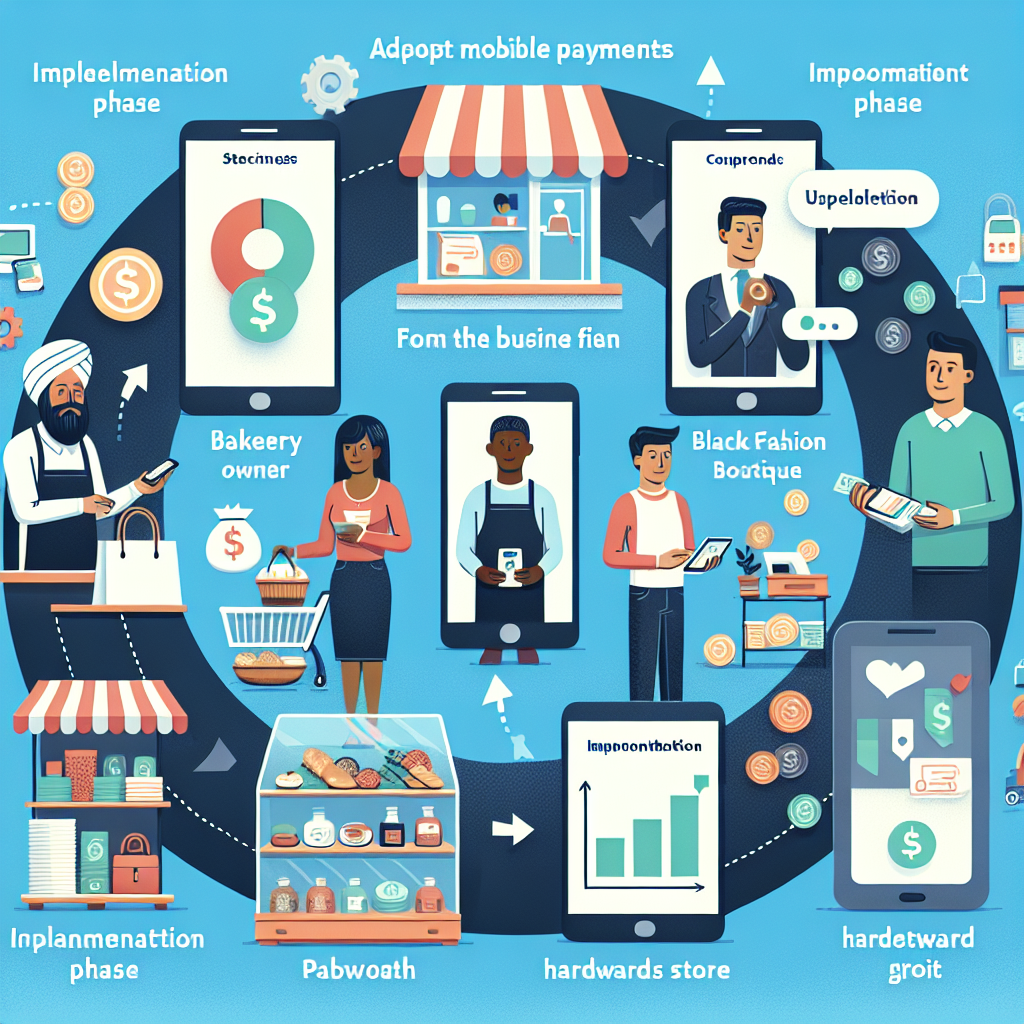-
Table of Contents
Increased Convenience and Accessibility for Customers
In today’s fast-paced world, convenience and accessibility are key factors that can make or break a business. With the rise of smartphones and mobile technology, adopting mobile payments has become increasingly important for businesses looking to stay competitive and grow. Mobile payments offer a range of benefits for both businesses and customers, making it a win-win situation.
One of the main advantages of mobile payments is the increased convenience it offers to customers. Gone are the days of fumbling for cash or digging through a wallet to find a credit card. With mobile payments, customers can simply tap their smartphones or scan a QR code to complete a transaction. This streamlined process saves time and eliminates the hassle of carrying physical payment methods.
Furthermore, mobile payments provide customers with greater accessibility. In today’s digital age, almost everyone has a smartphone, making it easier than ever for customers to make purchases on the go. Whether they are at a physical store, browsing online, or even attending an event, customers can make payments quickly and easily using their mobile devices. This accessibility not only enhances the customer experience but also increases the likelihood of impulse purchases, ultimately boosting sales for businesses.
Another benefit of adopting mobile payments is the ability to offer a wider range of payment options. Traditional payment methods such as cash and credit cards have limitations, but mobile payments open up a whole new world of possibilities. Customers can choose to pay with various digital wallets, such as Apple Pay or Google Pay, or use mobile banking apps to transfer funds directly. By offering these options, businesses can cater to a broader customer base and attract tech-savvy individuals who prefer the convenience of mobile payments.
Moreover, mobile payments provide businesses with valuable data and insights. When customers make mobile payments, their transaction details are recorded, allowing businesses to gather information about their purchasing habits and preferences. This data can be used to personalize marketing efforts, improve inventory management, and enhance overall customer satisfaction. By leveraging this information, businesses can make data-driven decisions that drive growth and increase customer loyalty.
Security is another crucial aspect of mobile payments. Many people are concerned about the safety of their financial information when making online transactions. However, mobile payments offer advanced security features that protect sensitive data. Encryption technology and tokenization ensure that customer information is securely transmitted and stored, reducing the risk of fraud or identity theft. By adopting mobile payments, businesses can provide customers with peace of mind, building trust and loyalty in the process.
In conclusion, adopting mobile payments can significantly benefit businesses by increasing convenience and accessibility for customers. The streamlined process and wider range of payment options offered by mobile payments enhance the customer experience and boost sales. Additionally, businesses can leverage the data and insights gathered from mobile payments to make informed decisions and personalize marketing efforts. With advanced security features, mobile payments also provide customers with peace of mind. In today’s digital age, embracing mobile payments is a smart move for businesses looking to grow and thrive in a competitive market.
Streamlined Payment Processes and Reduced Transaction Costs
In today’s fast-paced digital world, businesses are constantly looking for ways to streamline their operations and reduce costs. One area where significant improvements can be made is in the payment process. Traditional payment methods, such as cash or checks, can be time-consuming and costly for businesses to handle. However, by adopting mobile payments, businesses can not only streamline their payment processes but also reduce transaction costs.
Mobile payments, also known as mobile wallets or digital wallets, allow customers to make payments using their smartphones or other mobile devices. This technology has gained popularity in recent years due to its convenience and security features. By accepting mobile payments, businesses can offer their customers a faster and more convenient way to pay for goods and services.
One of the main advantages of mobile payments is the speed at which transactions can be processed. With traditional payment methods, customers often have to wait in line to make a payment, especially during peak hours. This can lead to frustration and a loss of potential sales. However, with mobile payments, customers can simply tap their smartphones on a payment terminal and complete the transaction within seconds. This not only improves the customer experience but also allows businesses to serve more customers in less time.
In addition to speed, mobile payments can also help businesses reduce transaction costs. Traditional payment methods, such as credit card processing, can be expensive for businesses due to transaction fees and other associated costs. However, mobile payments often come with lower transaction fees, making them a more cost-effective option for businesses. By adopting mobile payments, businesses can save money on transaction fees and allocate those savings towards other areas of their operations.
Furthermore, mobile payments can also help businesses reduce the risk of fraud. Traditional payment methods, such as cash or checks, are susceptible to theft and counterfeit. On the other hand, mobile payments use advanced encryption and authentication technologies to ensure the security of transactions. This can give businesses and their customers peace of mind knowing that their financial information is protected.
Another benefit of mobile payments is the ability to track and analyze customer data. Mobile payment platforms often provide businesses with valuable insights into customer behavior and preferences. By analyzing this data, businesses can make informed decisions about their products, marketing strategies, and customer service. This can ultimately lead to improved customer satisfaction and increased sales.
In conclusion, adopting mobile payments can help businesses streamline their payment processes and reduce transaction costs. By offering customers a faster and more convenient way to pay, businesses can improve the customer experience and serve more customers in less time. Additionally, mobile payments often come with lower transaction fees, allowing businesses to save money and allocate those savings towards other areas of their operations. Furthermore, mobile payments offer enhanced security features, reducing the risk of fraud. Lastly, the ability to track and analyze customer data can provide businesses with valuable insights to improve their products and services. Overall, embracing mobile payments can be a game-changer for businesses looking to grow and thrive in today’s digital age.
Enhanced Security and Fraud Prevention Measures

In today’s digital age, mobile payments have become increasingly popular among consumers. With the rise of smartphones and the convenience they offer, more and more people are opting to make purchases using their mobile devices. As a business owner, it is crucial to stay ahead of the curve and adopt mobile payment solutions to cater to this growing trend. Not only can mobile payments streamline your business operations, but they can also help your business grow in various ways.
One of the key advantages of adopting mobile payments is the enhanced security and fraud prevention measures they offer. Traditional payment methods, such as cash or credit cards, are susceptible to theft and fraud. With mobile payments, however, the risk of fraud is significantly reduced. Mobile payment platforms utilize advanced encryption technology to protect sensitive customer information, making it much more difficult for hackers to gain access to personal data.
Furthermore, mobile payments often require additional layers of authentication, such as fingerprint or facial recognition, adding an extra level of security. This not only protects your customers but also safeguards your business from potential liability and reputational damage associated with data breaches or fraudulent activities.
By adopting mobile payments, you can also benefit from the added convenience of real-time transaction monitoring. Mobile payment platforms provide you with instant access to transaction data, allowing you to track and analyze sales in real-time. This valuable information can help you identify patterns, trends, and customer preferences, enabling you to make data-driven decisions to optimize your business operations.
Moreover, mobile payments can streamline your accounting processes. With traditional payment methods, manual reconciliation and record-keeping can be time-consuming and prone to errors. Mobile payment platforms, on the other hand, automate these processes, providing you with accurate and up-to-date financial data. This not only saves you time but also ensures that your financial records are accurate and compliant with regulatory requirements.
In addition to enhanced security and streamlined operations, adopting mobile payments can also help your business attract new customers. Many consumers today prefer the convenience of mobile payments and actively seek out businesses that offer this option. By accepting mobile payments, you can tap into this market and expand your customer base. Furthermore, mobile payment platforms often offer loyalty programs and incentives, allowing you to reward your customers and foster customer loyalty.
Lastly, adopting mobile payments can help your business stay competitive in a rapidly evolving marketplace. As more businesses embrace mobile payment solutions, customers have come to expect this option as a standard offering. By not offering mobile payments, you risk losing customers to your competitors who do. By embracing this technology, you demonstrate your commitment to innovation and customer satisfaction, positioning your business as a leader in your industry.
In conclusion, adopting mobile payments can provide numerous benefits for your business. From enhanced security and fraud prevention measures to streamlined operations and increased customer satisfaction, mobile payments can help your business grow in various ways. By staying ahead of the curve and embracing this technology, you can position your business for success in an increasingly digital world.
Improved Customer Engagement and Loyalty Programs
In today’s digital age, businesses are constantly looking for ways to improve customer engagement and loyalty. One effective strategy that has gained popularity in recent years is adopting mobile payments. By allowing customers to make purchases using their smartphones, businesses can not only streamline the payment process but also enhance customer satisfaction and loyalty.
One of the key benefits of mobile payments is the convenience it offers to customers. With just a few taps on their smartphones, customers can complete transactions without the need for physical cash or credit cards. This ease of use not only saves time but also eliminates the hassle of carrying multiple cards or counting change. By providing this convenience, businesses can attract more customers and encourage repeat purchases.
Moreover, mobile payments enable businesses to offer personalized and targeted loyalty programs. With the help of mobile payment apps, businesses can track customer spending habits and preferences. This valuable data can then be used to create customized loyalty programs that reward customers for their loyalty and encourage them to continue shopping with the business. For example, a coffee shop can offer a mobile payment app that tracks the number of purchases made by a customer and rewards them with a free coffee after a certain number of visits. This not only incentivizes customers to choose the coffee shop over competitors but also creates a sense of exclusivity and appreciation.
Furthermore, mobile payments allow businesses to engage with customers in real-time. Through push notifications and in-app messaging, businesses can send personalized offers, discounts, and updates directly to customers’ smartphones. This direct communication channel enables businesses to stay top-of-mind and build a stronger relationship with their customers. For instance, a clothing retailer can send a notification to customers about a flash sale happening in-store, enticing them to visit and make a purchase. By leveraging mobile payments, businesses can effectively communicate with their customers and drive sales.
Another advantage of mobile payments is the enhanced security it provides. With traditional payment methods, there is always a risk of credit card information being stolen or lost. However, mobile payment apps use advanced encryption technology to protect customer data, making it more secure than traditional payment methods. This added security not only gives customers peace of mind but also builds trust and loyalty towards the business.
In conclusion, adopting mobile payments can significantly improve customer engagement and loyalty programs for businesses. The convenience, personalization, and real-time communication offered by mobile payments can attract more customers, encourage repeat purchases, and build stronger relationships. Additionally, the enhanced security provided by mobile payment apps can give customers peace of mind and build trust towards the business. As technology continues to advance, businesses that embrace mobile payments will have a competitive edge in the market and be better positioned for growth.
Expanded Market Reach and Global Business Opportunities
In today’s digital age, businesses are constantly seeking ways to expand their market reach and tap into global business opportunities. One effective strategy that has gained significant traction in recent years is adopting mobile payments. By embracing this technology, businesses can not only enhance their customer experience but also open doors to new markets and increase their revenue potential.
One of the key advantages of mobile payments is the ability to reach a wider audience. With the increasing popularity of smartphones and the convenience they offer, more and more consumers are opting for mobile payment solutions. By integrating mobile payment options into your business, you can cater to this growing segment of customers who prefer to make purchases using their mobile devices. This expanded market reach can help you attract new customers and increase your sales.
Furthermore, mobile payments enable businesses to tap into global business opportunities. With traditional payment methods, businesses often face challenges when it comes to accepting payments from customers in different countries. However, mobile payment solutions can overcome these barriers by providing a seamless and secure way to accept payments from customers around the world. This opens up a whole new realm of possibilities for businesses, allowing them to expand their operations internationally and tap into new markets.
Another advantage of mobile payments is the potential for increased revenue. By offering mobile payment options, businesses can provide a more convenient and efficient checkout process for their customers. This can lead to higher conversion rates and increased sales. Additionally, mobile payments often come with features such as loyalty programs and personalized offers, which can further incentivize customers to make purchases. By leveraging these features, businesses can not only increase their revenue but also build customer loyalty and drive repeat business.
Moreover, adopting mobile payments can also help businesses streamline their operations and reduce costs. Traditional payment methods often involve manual processes, such as handling cash or processing checks, which can be time-consuming and prone to errors. Mobile payments, on the other hand, automate these processes, allowing businesses to save time and resources. Additionally, mobile payment solutions often come with built-in analytics and reporting tools, which can provide valuable insights into customer behavior and help businesses make data-driven decisions. By leveraging these tools, businesses can optimize their operations, reduce costs, and improve their overall efficiency.
In conclusion, adopting mobile payments can be a game-changer for businesses looking to expand their market reach and tap into global business opportunities. By embracing this technology, businesses can reach a wider audience, attract new customers, and increase their revenue potential. Furthermore, mobile payments offer a more convenient and efficient checkout process, which can lead to higher conversion rates and increased sales. Additionally, mobile payments can streamline operations, reduce costs, and provide valuable insights into customer behavior. With all these benefits, it’s clear that mobile payments are a powerful tool that can help businesses grow and thrive in today’s digital landscape.
Q&A
1. How can adopting mobile payments help your business grow?
Mobile payments can help businesses grow by increasing customer convenience, expanding customer reach, and improving transaction efficiency.
2. What are the benefits of adopting mobile payments for businesses?
Benefits of adopting mobile payments include faster and more secure transactions, reduced cash handling costs, improved customer experience, and access to valuable customer data for targeted marketing.
3. How can mobile payments expand customer reach?
Mobile payments enable businesses to reach customers who prefer cashless transactions, including tech-savvy millennials and Gen Z. It also allows businesses to tap into the growing trend of online and mobile shopping.
4. How do mobile payments improve transaction efficiency?
Mobile payments eliminate the need for physical cash handling, reducing the time spent on counting and reconciling cash. They also enable faster transactions, reducing waiting times for customers and increasing overall efficiency.
5. What role does customer convenience play in adopting mobile payments?
Mobile payments offer customers the convenience of making purchases anytime, anywhere, using their smartphones. This convenience can attract more customers and encourage repeat business, ultimately contributing to business growth.








